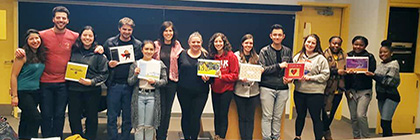Learning a language is a meaningful experiential and cultural opportunity. In the case of York University students enrolled in Portuguese 2000 (Intermediate Portuguese), this past year provided the opportunity to learn about the Portuguese nation of East Timor and respond to the difficulty for many children there to access education and literacy.
In an effort to reach out to these children, students in the class wrote books of short stories that will be delivered to newly created libraries in Timor.

A launch event for the books took place on April 3, and students delivered presentations on their work before a jury that included Professor Maria João Dodman (Portuguese and Luso-Brazilian Studies); Ana Paula Ribeiro, coordinator of Portuguese Teaching in Canada, Camões, Instituto da Cooperação e da Língua (Camões I. P.), the co-sponsor of this initiative; scholar and writer Irene Marques; and journalist, writer and curator of the Gallery of Portuguese Pioneers, Humberta Araújo.

Students spoke of their creative process, their goals and their selection of themes and illustrations. Jury members had an opportunity to ask questions, to offer recommendations and to speak of the value of the stories, and noted the universal qualities of love, freedom and equality expressed in the writing. All discussions were conducted in Portuguese.
Professor Inês Cardoso, visiting scholar under an international protocol with Camões I. P. (Portuguese and Luso-Brazilian Studies, Faculty of Liberal Arts and Professional Studies), developed and guided the students over some months.
Students wrote in groups and used the Storybird platform. The site offered a variety of illustrations; however, one group decided to illustrate their work themselves.
The project comprised many steps. First, students read sources that informed them about Timorese culture and traditions, as a way of writing texts better adjusted to the target audience, and then they submitted initial ideas. After formative feedback was provided, students proposed a first complete draft of the story, which was then revised by the instructor, as well as writer Rosa Maria Oliveira and assistant coordinator of the “Formar Mais” Project in Timor, Ana Luísa Oliveira.
East Timor is a developing young nation where there have been diagnosed needs regarding the promotion of reading in Portuguese. A partnership with the project “Formar Mais – Continuing Education for Teachers” (Camões, I. P.) allowed the class to engage in deeper considerations about the realities of Timor, and also to guarantee that these books will be delivered to children and their newly created libraries.
This project is in line with the students’ learning goals, and they benefitted from a reading-writing interaction that promoted both reading and a more informed writing production with greater esthetic value.
The great values of the works presented have been recognized by children literature scholar Ana Margarida Ramos from the University of Aveiro (Portugal). Along with the literary quality of the texts produced and their visible connection with Timorese context, she highlighted the commitment of these “foreign” and “heritage learners” (Portuguese, Brazilian and Angolan background) who managed to progress in the Portuguese language to accomplish, above all, a solidarity purpose.
In a letter she wrote to students, she noted that “language and literature reduce distances, remove boundaries and tighten the links between people” and that “stories continue to be important vehicles of communication and sharing.”


